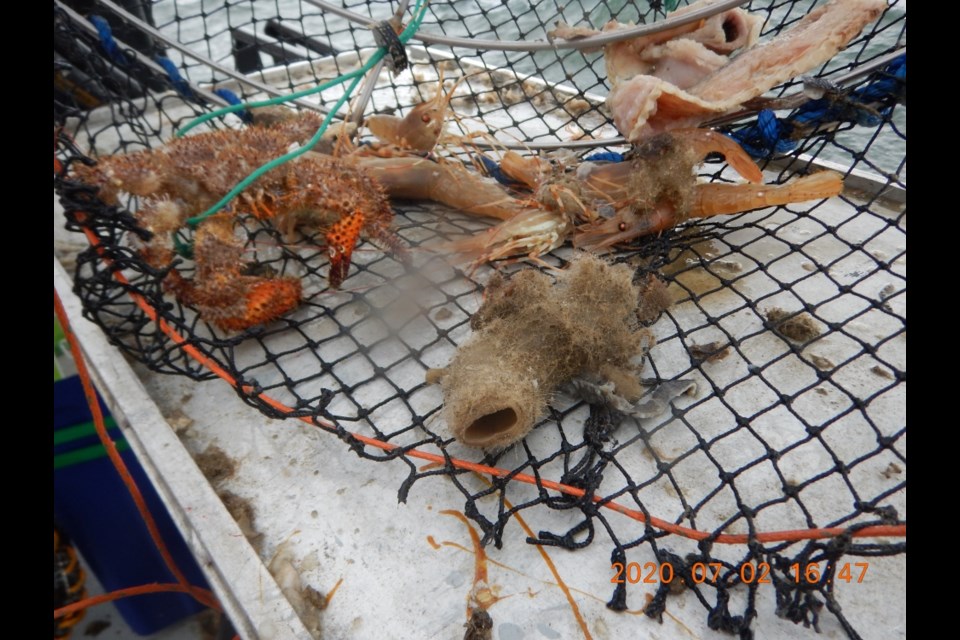A sa国际传媒 fisherman has caught a large fine — $250,000 — for a series of violations under the Fisheries Act and against Pacific Fisheries Regulations after he was found to have set prawn traps in a protected glass sponge reef area near Sechelt.
Fishery officer Bill van Egteren said he’s “pretty sure this is precedent-setting for commercial prawn fishing violations.”
van Egteren, the primary investigator on the file, told Coast Reporter Fisheries and Oceans sa国际传媒 (DFO) received a call on July 2, 2020, that commercial prawn gear was set in the Strait of Georgia Glass Sponge Reef Refuges near Sechelt, a . The Marine Patrol Program (MPP) vessel (a Coast Guard vessel staffed with Conservation and Protection fishery officers) attended the location and found two strings of commercial prawn gear, with a total of 109 traps. As the officers hauled out the gear, pieces of broken glass sponge reef came up with the traps.
The gear was transferred to fishery officers in Powell River. Via the Boat Monitoring System, conservation was able to see the vessel Darkstar was in the area. On July 3, the Marine Patrol Program officers visited the site near Sechelt again and found three more strings of commercial prawn gear within the glass sponge reef refuge, said van Egteren.
The MPP officers boarded Darkstar and arrested its skipper, Dean Keitsch, took a statement from him and seized the strings and 164 traps. Two deckhands on board the vessel did not have their commercial fishing licences with them, said van Egteren.
Then on July 9, an at-sea observer for the commercial prawn fishery reported the Darkstar was hauling up gear in Pylades Channel (between Vancouver Island and the Gulf Islands) between the hours of 7 p.m. and 7 a.m., violating the conditions of the commercial licence. The Marine Patrol Program officers attended, and DFO realized the Darkstar’s set haul button had not been activated — the electronic monitoring program had not been used all season, and it was already half way through the commercial fishing season, said van Egteren. Five more strings of gear were seized with a total of 258 traps.
Darkstar was located coming into its home port in Steveston around noon on July 9 and was found to have 448 pounds of live prawns and 35 pounds of live shrimp on board. Because the set haul button had not been pressed, the haul was determined to be illegally caught, said van Egteren. Fishery officers seized the catch and sold it to a buyer. The cheque for that sale was held until after the court proceedings.
Dean Keitsch of Delta pled guilty to seven of the 13 violations and was found guilty of 13 violations of the Fisheries Act. After a 14-day trial in 2022 and 2023, Judge Steven Merrick sentenced Keitsch to pay fines totalling $250,000 and to forfeit all seized gear (valued at approximately $80,000) in Sechelt Provincial Court on Jan. 31.
The fines range from $100 to $70,000 for offences that took place starting sometime between June 4 and July 9, 2020, and ending on July 29 of that year. Keitsch was found to have committed two counts of fishing for a species of shellfish in a closed time, two counts of failing to produce registration/licence on demand, eight counts of failing to comply with the terms and conditions of a lease/licence, and one count of purchasing, selling or possessing illegally caught fish, all at or near Sechelt.
van Egteren said Keitsch was charged with failing to keep accurate records in the logbook. “It wasn’t really worth the paper it was written on,” van Egteren said, and is considered a significant violation. Keitsch also failed to submit his records within the given timeframe.
During the trial, van Egteren said the judge heard powerful impact statements from a DFO expert witness, Dr. Anya Dunham, and a shíshálh First Nation member who shared concerns about illegal fishing in the globally unique habitat.
Glass sponge reefs off sa国际传媒’s coast — including reefs near Sechelt and in Howe Sound — have been closed to fishing , and new closures have been added in the years since as more of the rare reefs are discovered. Glass sponge reefs were considered to have gone extinct 40 million years ago until they were rediscovered in Hecate Strait in 1987. Their silica structures are slow to grow and, as their name suggests, delicate and sensitive to human disturbance. Glass sponge reefs provide invaluable habitat and rearing grounds for a variety of sea creatures, act as a filtration system and sequester carbon.
van Egteren said he hopes people will “appreciate the protected areas that we do have,” and acknowledged that it took the cooperation of many people from DFO to expert witnesses and shíshálh Nation to see this case through. “To get this kind of result, it was a really good win for Mother Nature.”
He also asks anyone who witnesses illegal activity that violates the Fisheries Act to call the toll-free reporting line for the DFO Pacific region at 1-800-465-4336, or to email details to [email protected].

-adam-taylor,-mlss.jpg;w=120;h=80;mode=crop)

.jpg;w=120;h=80;mode=crop)